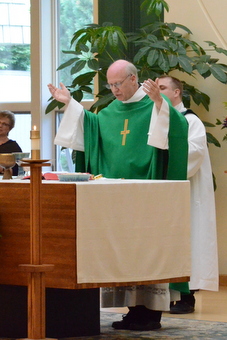The Last Word - May 2015
Body, Blood, Soul and Divinity
The ancient Romans persecuted Christians for many reasons. Some those reasons were based on misunderstandings of what Christians were all about. One of those misunderstandings has to do with the Eucharist. Romans heard rumors about eating a man's body and drinking his blood, and they quite understandably thought this might be cannibalism. The charge sounds outrageous to you and to me, but you have to admit, it is not hard to see how someone could get that impression.
I used to interview all the children making first Communion in the parish. I no longer do that because I now have three parishes and many more children. In those interviews, I was always very careful about how I spoke about the real presence of Christ in the Eucharist. Children can be very literal-minded and talking about drinking someone's blood (even that of Christ) could be confusing, if not downright distressing.
I am also rather uncomfortable with what are sometimes referred to as the Eucharistic miracles often dating back to the Middle Ages. Stories of these miracles speak about hosts that began to bleed or hosts that appeared to turn into a mass of living flesh. The faithful are not bound to believe in these things. Every Christian is free to make up his or her own mind. No Christian, indeed, is ever required to believe in any private revelation, even when that private revelation (such as those of Fatima or Lourdes) is approved by the Church. I realize that some Catholics may find such reports helpful to their faith and that is wonderful. But for me (and you can certainly disagree) the stories of these Eucharistic miracles distract from the full meaning of the Eucharist rather than advancing true devotion. Maybe it is just me?
You see, the Church has always taught and declared in the decrees of the Council of Trent that the whole Christ is present in each of the forms or species of the Eucharist. That is, the whole Christ is present under the form of bread after the consecration: "Body, Blood, Soul and Divinity." Similarly, the whole Christ, "Body, Blood, Soul and Divinity," is present under the form of wine after the consecration. It is never only the Body of Christ under the form of bread or only the Blood of Christ under the form of wine. It is those things but not only. The bread is truly changed, and the wine is truly changed. And we refer to them respectively as the Body and Blood of Christ, and so, they are by the power of the words of consecration. But, the Body is never present without the whole resurrected person of Christ, and the Blood is never present without the whole resurrected Christ. Christ is present in the Eucharist, whole and complete. That is why it is rightly said that even if you receive holy Communion only under the species of the bread and do not receive under both kinds, you still receive the whole Christ.
So, while I absolutely believe that the bread becomes His Body and the wine becomes His Blood, I sometimes prefer to speak of Christ giving Himself to us in the Eucharist; Christ entering into Communion with us. Maybe I am wrong, but I think that is sometimes more helpful and more clear. And, I think that makes it easier to speak of the presence of Christ in the Eucharist rather than leaving open the possibility of misunderstanding.
Rev. Msgr. Michael J. Henchal











